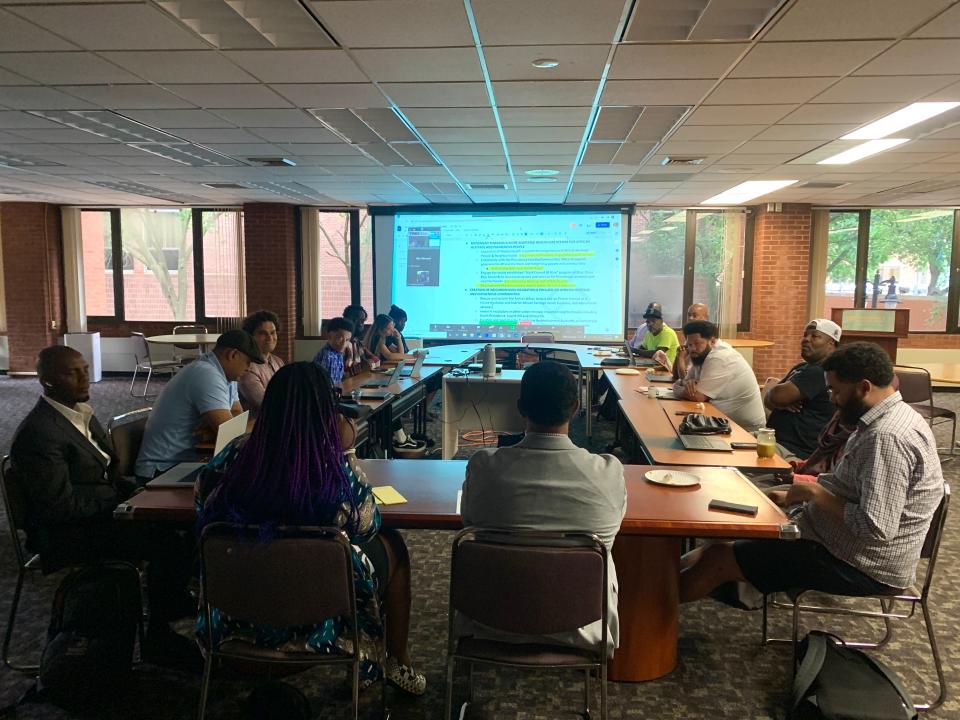School, think tank, full-time council: Providence reparations panel's growing agenda
Providence's reparations panel, which is weighing how to spend $10 million in federal pandemic relief funds, is widening its list of recommendations.
An 11-point investment plan previewed last week and approved Monday has grown, with numerous sub-points, such as reforming the city's civilian police review board by increasing its transparency and requiring that all of its members live in Providence.
At a meeting Monday, Commissioner Christian Potter made a request to "establish a library in partnership with the Providence Community Libraries and bring the Frazier Collection back." But on Tuesday, the mayor's office said the panel had "voted to work with [the Providence Public Library] to bring back the Frazier Collection, not to establish a library."
The Frazier Collection includes biographies, music, poetry, photos and more from Black authors and artists, dating back to 1619.
At Monday's meeting, Keith Stokes, who previously helped the city compile a report on its history of racism as a foundation for reparations, cautioned the committee against a tendency to "get too much in the weeds" or "we’ll never get it done."

Within an hour, the commission had gotten through just two points of the plan as a time check was announced. Jokingly, Chairman Rodney Davis told Silas Pinto, the city's director of diversity, equity, inclusion and belonging, that he had 30 seconds to comment.
Various wording changes and clarifications were discussed, such as adding "behavioral health" to a section on expanding mental-health supports, or defining an "incubator" in a section on providing business, educational and social services.
New Providence board weighs how to offer reparations, from housing to education
The plan appears to have moved past how to invest the city's American Rescue Plan Act funds and is also seeking to affect the work of government, creating new bodies such as a Municipal Diversity, Inclusion and Equity Commission and a City Commission for Indigenous Rights, neither of which the panel delved into in-depth during its meeting.
The panel also recommended a policy think tank and debated adding a 16th seat to the City Council that could function as an "at-large" position aimed at boosting representation of the disenfranchised.
Potter opposed the idea, contending that such a plan "usually gives an extra vote to not us" and "we usually don't win that," his suggestion being that the extra seat wouldn't be representative of the communities on which the panel is focused. Ultimately, the panel opted for recommending making the council full-time and paid.
'Eventually the entire state': Providence reparations panel believes final report will provide framework for other cities
On education, the panel called for the creation of a charter school for African heritage and Indigenous students, and a K-12 curriculum for the teaching of the city's "Matter of Truth" report, which detailed Providence's ties to the slave trade, its history of urban renewal and displacement and other forms of racism.
It's unclear how all of the items on the list would be funded, such as the school and the library. It remains to be seen whether those funds would come directly from the $10 million from American Rescue Plan Act money for which the panel is recommending uses, or from future investments the panel hopes to secure.
Nearly 200-page analysis: Providence unveils 'truth-telling' report on 4 centuries of racial injustice in RI
For the panel, this is just the beginning. Stokes described the $10 million as "a starting point," adding that "the recommendations that you make are an equal starting point."
"So the next stage would be is when the commission’s report is delivered to the mayor and the council, then they and staff, administration, will work on development, programs and enactment policies."
This article originally appeared on The Providence Journal: Reparations panel has growing list: School, full-time council

